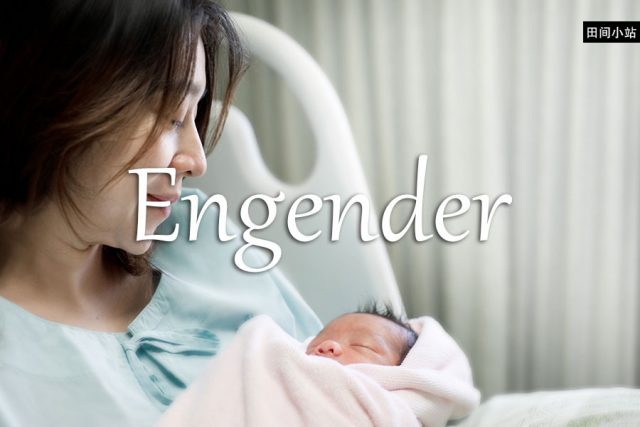本文经授权转载自微信公众号:田间小站

SAT TEM8 GMAT GRE
外刊例句
- Insufficient computing power as internet users flock to a customer’s service can engender errors—and lost sales as users encounter error pages.
当互联网用户涌向某个客户的服务时,计算能力不足可能就会导致出错,并在页面打不开时错失销售机会。
——《经济学人》 - Studies have found that women in the boardroom have different values, make decisions differently and engender a more cooperative atmosphere.
研究发现,董事会中的女性成员有着不同的价值观,会做出不同的决策,并营造出更加合作的氛围。
——《纽约时报》
基本释义
[verb] cause or give rise to (a feeling, situation, or condition)
[动词] 造成或引起(某种感觉、情况或状况)
深入解读
一眼看到 engender 这个单词,不难猜到它是一个与熟词 gender (性别)同源的单词,两者都源自于拉丁语 genus (种族、种类)。
其中 engender 由前缀 en- (使……)+词根 gen (出生、产生;种族)+ der 构成,于14世纪初经古法语 engendrer (生育;导致、引起)进入英语后,最初也是用来表示“生育”,不过这个含义如今已不再流行。
现在主要使用其拓展含义指“导致、引发、产生”,常作正式用语使用,多意味着像分娩时婴儿降临那般使某种感觉、情况或状况突然或立即产生,而非分娩前的那种逐渐孕育发展成熟的过程,比如:
- 那个情绪无常的女演员在镜子前摆姿势。她还不知道她的最新电影一上映就引起了很大争议。
The volatile actress postured before the mirror. She didn't know that her latest film engendered a lot of controversy as soon as it was released.
名著用例
She began to envy those pirouetters, to hunger for the hope and happiness which the fascination of the dance seemed to engender within them.
她开始嫉妒这些快速旋转的人来,渴望能得到那种似乎是由跳舞的魅力所产生的希望和幸福。
出自英国小说家托马斯·哈代(Thomas Hardy)的长篇小说《还乡》(The Return of the Native)。
同近义词
- generate: cause (something, especially an emotion or situation) to arise or come about
- arouse: evoke or awaken (a feeling, emotion, or response)
- provoke: stimulate or give rise to (a reaction or emotion, typically a strong or unwelcome one) in someone
